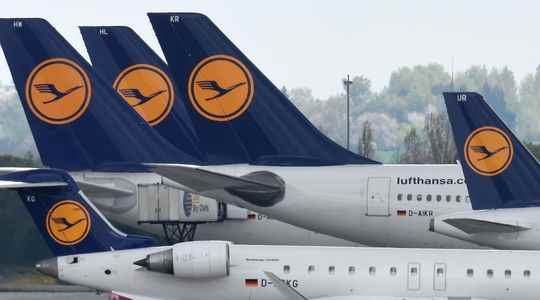The airline sector is picking up again after two particularly difficult years due to the health crisis. The recovery in traffic should reach this summer up to 95% of its 2019 level, according to Eurocontrol, the European organization for the safety of air navigation. But for several weeks, many flights have been canceled due to a lack of staff. German giant Lufthansa is the latest example. For lack of arms, the group announced on Thursday that it would cut nearly 900 domestic and European flights scheduled for Fridays and weekends in July, to and from Frankfurt and Munich. Its low-cost subsidiary, Eurowings, was also forced to cut “several hundred flights” the same month.
Another country, another reason but a similar result: also on Thursday, at Paris-Charles de Gaulle airport, a call for a strike by several unions – wanting a salary increase of 300 euros to cope with inflation – provoked a drop of nearly 25% in flights. The Paris-Orly or Marignane airports, in Marseille, are also affected by this strike movement which affects both airport staff and security agents.
This phenomenon is not restricted to France. At Brussels Airport, Aviapartner baggage handlers spontaneously stopped work for three hours on June 2 to protest against their workload. Salary cuts, higher productivity, shorter rest time between European and long-haul flights… The new collective labor agreement applied to cabin crew and pilots at the start of the health crisis to allow the company to surviving is no longer suitable for employees who wish to return to working conditions identical to before Covid. “The workers had to accept all this with a knife to their throats. Now that the sector is taking off again, the balance of power with the management is changing”, explains in the eveningDidier Lebbe, permanent secretary CNE, a Belgian trade union.
Britain’s main union, Unite, also staged a five-day strike in April among baggage handlers at Luton Airport and is threatening to do the same at British Airways this summer. Low cost companies like Ryanair are not spared. In Italy, two unions announced a 4-hour strike on Wednesday in the Irish company to demand better wages and denounce the refusal to grant compulsory rest days this summer. Same thing at Volotea or Easyjet. These movements have led to the cancellation of 360 flights in Italy according to the transport manager of the UIL trade union confederation, Claudio Tarlazzi, quoted by the AGI agency.
“Some companies or airports were caught off guard”
The airlines, which massively laid off during the health crisis, had been dreading for several months to witness traffic jams of passengers unable to access their planes on time. This is what happened during the weekends of Ascension and Pentecost in the airports of Amsterdam and London where scenes of chaos took place, for lack of personnel in number allowing passengers complete the formalities before their flight. “We warned at the start of the Covid crisis that we should not fire everyone because when it resumes we would have trouble”, reminds AFP Livia Spera, general secretary of the European Transport Workers’ Federation. (AND F). “Governments have given aid to companies to overcome the crisis, but there has been no social counterpart,” she lamented.
For Paul Chiambaretto, professor at Montpellier Business School and director of the Pégase Chair, the first French chair dedicated to the economy and management of air transport, this labor shortage is due to a “conjunction of several phenomena” : “Layoffs or partial unemployment [lors de la crise sanitaire] allowed a certain number of employees in the aviation sector to see that they had other professional opportunities in other sectors. And on the other hand, the recovery is faster than expected. So it’s quite positive for the sector. But the time to reintegrate a certain number of employees takes time. Some companies or airports were a bit caught off guard,” he explains. on Franceinfodrawing a parallel with the restoration.
Rail transport is also beginning to be hit by social movements. The UK is preparing for the biggest train strike in more than 30 years, between June 21 and 25, to demand better wages and working conditions.
